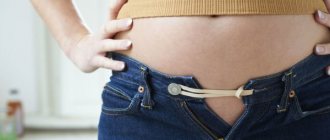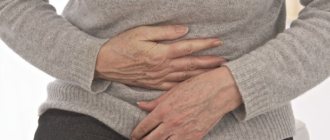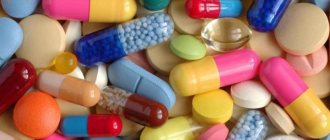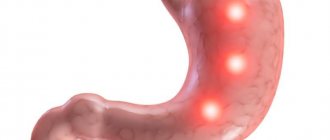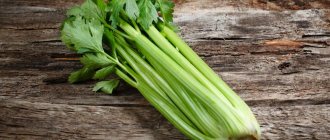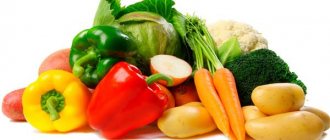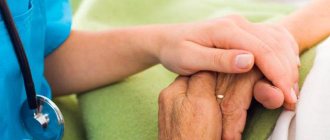Causes of gas formation in the intestines
The intestines are home to many bacteria that are harmless to health and support the functioning of this organ. But some carbohydrates cannot be completely digested, they are not absorbed, and are fermented by these bacteria. Therefore, rumbling appears in the stomach and gases are formed. Certain types of diseases can cause flatulence. But even healthy people have a predisposition to this disease. The reasons for persistent gases in the intestines may be due to inappropriate foods, indigestion, increased aerophagia, or a psychological state.
Poor nutrition
Eating the following foods contributes to the formation of gas:
- carbonated drinks;
- fruits with a lot of fiber;
- eggs;
- cabbage;
- legumes;
- pickled or salted vegetables;
It is important to pay attention not only to the consumption of certain foods, but also to what volume is taken. Overeating leads to poor digestion of food, as well as the accumulation of gases. If you wash down the dish with water, you will experience discomfort and pain from bloating that lasts for several hours.
Features of the body
Why do gases still accumulate in the intestines? The next factor is the physiological characteristics of the body. These include:
- swallowing air during a quick meal;
- stressful situations;
- postoperative period (abdominal surgery);
- physical activity after breakfast or lunch;
- breathing through the mouth due to a runny nose or smoking.
It is considered normal for gases to accumulate in the intestines during pregnancy , especially in the last trimester, as the uterus increases in size and puts pressure on the organs.
Menopause and premenstrual syndrome in women lead to changes in the body that impair absorption in the intestines and contribute to the appearance of flatulence.
Taking medications
Both food and medications can have side effects that include bloating. Often these include narcotic drugs that reduce pain syndromes, as well as capsules for diarrhea.
Fiber additives that contain psyllium cause the accumulation of gases - this is metamucil or fiberal. Especially if they are used in large quantities. It is important to monitor the symptoms, did they begin to appear after taking these drugs? If the medications you are using cause flatulence, consult your doctor.
Pathologies
Flatulence can also be caused by pathologies that signal serious illnesses. The following diseases lead to the formation of gases:
- gastritis, inflammation of the stomach walls;
- relaxed state of the esophageal sphincter;
- ulcer;
- hiatal hernia;
- irritable bowel syndrome;
- hepatitis;
- cholecystitis;
- esophageal diverticulum;
- severe infections.
Causes of flatulence
The causes of increased flatulence are:
- enzyme deficiency. If there is insufficient quantity of them, undigested food begins to be deposited in the intestines - it stagnates, rots and ferments, which causes the production of a large amount of gases. The excreted feces have a putrid odor;
- dysbiosis. During normal intestinal function, some microorganisms produce gases, others absorb them; when they are imbalanced, the amount of gaseous compounds increases;
- lack of physical activity in adults. This often happens after surgical interventions, when the patient’s physical activity is temporarily limited according to indications, and intestinal motility is greatly reduced;
- diseases of the gastrointestinal tract. Failure of any organ of the digestive tract (duodenum, small intestine, colon, etc.) leads to indigestion and increased gas production;
- poor nutrition. If the menu is dominated by foods that provoke increased gas formation and fermentation, flatulence occurs. Such gas-forming products include: lamb, apples, legumes, cabbage, carbonated drinks and other foods;
- the presence of parasites in the body. The presence of helminthiasis in the intestinal lumen provokes the development of flatulence and bloating;
- stress. Impaired intestinal motility can occur “due to nervousness”;
- age factor. Here we can distinguish senile and newborn flatulence. The first is due to an age-related decrease in the tone of the intestinal muscles, a lack of enzymes; in a newborn child this happens due to imperfections in the digestive system.
Before getting rid of gases, you should find out the cause of flatulence, but you must definitely fight this phenomenon. Both men and women suffer from flatulence equally.
Bloating and gas after eating
The reason for the accumulation of gases is not only the choice of foods consumed, but also their compatibility. This is especially evident after a festive feast, drinking alcoholic beverages with foods that are incompatible with each other.
Symptoms of increased gas formation
The degree of manifestation of symptoms depends on the individual characteristics of the body and its reaction to food. However, to recognize the problem, you can observe the following symptoms. The main signs of flatulence include:
- Gas release. It is considered normal if the desire to pass gas does not exceed 22 times a day.
- Belching. If you belch after eating, this is quite normal. But if such urges are felt frequently, this indicates gas in the intestines.
- Discomfort and pain in the abdominal area appears during the passage of gases through the colon.
- Bloating after even a small meal.
Causes of flatulence after eating
The body's predisposition to the occurrence of flatulence is explained by the different composition of the microflora in the large intestine. Provoking reasons may be violations:
- diet;
- digestive system;
- motor activity of the gastrointestinal tract;
- norms of gas-forming bacteria;
- excretory function;
- emotional and mental state;
- dysbiosis.
Overloading the stomach with fatty foods and in large quantities causes the formation of gases. Enzyme deficiency, impaired circulation of bile acids - all these are the consequences of haste when taking, swallowing large pieces, smoking while eating, as well as unsuccessfully installed dentures.
Bloating due to changes in diet
Swelling and colic in the abdomen often occur in people who completely abstain from meat, i.e., vegetarians. The body simply does not have time to get used to the new diet in time.
Begins to react inappropriately with the manifestation of unpleasant symptoms: constipation, loose stools, diarrhea, nausea, vomiting, rumbling, bubbling gases in the stomach.
Sometimes food allergies lead to bloating and colic due to the entry of allergens into the body. The main ones are found in products: tangerines, strawberries, eggs, spices, honey, fish, meat.
Skin allergies appear: rashes, eczema. Sometimes there are disorders of the gastrointestinal tract:
- bloating;
- signs of dysbacteriosis;
- constipation;
- nausea, vomiting;
- diarrhea;
- formation of gases;
- pain in the peritoneal cavity.
On a note! If food allergens have caused bloating, then it is important to identify and exclude them from your diet, in particular, if necessary, consult with a nutritionist or undergo an examination, take skin swabs, and test for occult blood.
If the formation of gases has become an obsessive phenomenon, then it is worth reviewing your diet and giving up foods that increase bloating:
- salt;
- oatmeal;
- milk;
- beer;
- mushrooms;
- fresh cow's milk;
- dried apricots;
- onion;
- vegetables;
- tomatoes;
- beer;
- broccoli;
- pears;
- cheeses;
- braised cabbage;
- apples;
- watermelon;
- garlic;
- black bread;
- buckwheat;
- bananas;
- corn;
- cottage cheese;
- rice;
- pearl barley.
On a note! It is important to remember the most important foods that greatly increase fermentation, gas accumulation and bloating: these are fresh fruits, fresh black bread, marinades, gas drinks, bran, asparagus, cabbage, legumes.
Gases as a signal of the development of pathology
Sometimes the accumulation of gases is not only the cause of an unpleasant phenomenon that makes a person feel embarrassed, but also symptoms of certain diseases. These may be gastrointestinal disorders, colitis, liver cirrhosis, acute infections, intestinal obstruction, and the presence of parasites. Psychological trauma is no exception, depression, fear and strong feelings. In such cases, you will need the help of a psychologist.
Which doctor should I contact for help?
A gastroenterologist is a doctor who will conduct an initial examination and listen carefully to your complaints in order to clarify the nature of the disease, duration and characteristics of the course of the disease. After this, he will recommend taking a series of tests, visiting another specialist, and, if necessary, prescribing treatment. If an intestinal infection is detected, they will be referred to an infectious disease specialist. In rare cases, the help of a surgeon is necessary to remove gases.
How to diagnose the disease?
To prescribe treatment to a patient, you first need to take tests and undergo an examination. Usually, for flatulence, the following is prescribed:
- general analysis of blood, urine and feces, biochemical, bacteriological examination of the contents in the intestines;
- Ultrasound of the abdominal cavity;
- EGDS;
- colonoscopy.
A blood test will reveal inflammation, bleeding, the presence of parasites and tumors. The analysis is performed in the morning, on an empty stomach.
for urine analysis . It is taken early in the morning; for high-quality diagnosis, it is necessary to deliver the material to the laboratory as soon as possible. The concern is increased urine density and dark color.
A chemical test of stool will show a reaction to blood, bilirubin, and soluble protein. The presence of muscle fibers, fats, the nature and localization of the pathology is determined. Before taking the test, it is recommended to follow a diet for 4–5 days.
Ultrasound reveals enzyme deficiency, chronic diseases, and injuries. If a woman is pregnant, then a study is prescribed for any abnormalities of the internal organs.
EGDS will help examine the walls of the stomach, duodenum, and esophagus, which cannot be done without special equipment.
Colonoscopy allows you to examine the intestinal mucosa, assess its tone, confirm or exclude the presence of tumors and to identify a number of other diseases. Depending on the test results, treatment is prescribed.
What can gas in the intestines lead to?
Bloating leads to intestinal distension, stimulating peristalsis, causing pain. Of course, there is no clear difference between the accumulation of gases and the clinical manifestations of flatulence, because much depends on the individual characteristics and perception of the body. Some patients have a low response threshold, and even minor gas formation will be accompanied by significant clinical symptoms. People with a high threshold do not react even to a large accumulation of gases in the colon.
Changes in microflora, intestinal motility, dysbacteriosis and the process of poor digestion of food are all pathologies that flatulence leads to. As a result, symptoms that do not concern the intestines may appear - a burning sensation in the chest area, general weakness, and decreased mood.
Important! People suffering from flatulence experience shortness of breath, leading to dyspeptic asthma.
Drug treatment
Next, you should consider the issue of gas formation in the intestines, how to get rid of it with the help of medications. This is carried out using complex therapy, which involves symptomatic, pathogenetic and etiotropic treatment. If the cause of severe gas production is a disease in the digestive system, then it should first be cured.
Taking antispasmodics helps to quickly eliminate painful symptoms: No-shpa, Drotaverine. When bloating begins from air entering the stomach during chewing, measures are taken to prevent this process.
Severe gas formation, how to get rid of it using pathogenetic therapy, seems to be the following medication:
- Sorbents - Enterosgel, Phosphalugel, remove toxins from the system, Activated carbon, but you cannot drink it for a long time due to a large number of side effects.
- Enzymatic agents - Pancreatin, Mezim, improve digestive function.
- Defoamers - Simethicone, Dimetiko extinguish the foam, which is the form of gases in the intestines.
How to eliminate severe gas formation in the intestines using etiotropic therapy that combats the causes that contribute to the release of gases:
- Dynamic flatulence is eliminated by improving intestinal motility. To do this you need to take Cerucal.
- Mechanical flatulence, which can cause swelling or constipation, is eliminated depending on the cause, that is, the disease. If the cause is a tumor, then treatment is carried out in the form of surgery. For constipation, laxatives are used.
- To normalize intestinal function and eliminate dysbiosis, you need to take probiotics, which contain live bacteria.
How to quickly and safely remove increased gas formation in the intestines with the help of medications. Espumisan is considered the most effective and harmless. It has virtually no contraindications; it can be taken by children and the elderly, pregnant and lactating mothers with diabetes.
How to get rid of gases in the intestines?
Some may believe that increased gas production is a problem that should not be paid much attention to. But, it is not as simple as it seems at first glance. It develops in both children and adults and can be a sign of serious diseases. In some cases, it is enough to choose a diet, while in others, medications are needed. Treatment can be prescribed in combination and aimed at eliminating symptoms.
Anti-flatulence medications
When suffering from gas , few people immediately run to the doctor; treatment is most often carried out at home. For frequent bloating and flatulence, the following medications are prescribed:
- Metoclopramide , which increases the tone of the stomach walls, accelerates bowel movements;
- Mezim, Creon, Pancreatin , if the body has insufficient production of bile to digest proteins, carbohydrates and fats;
- Drotaverine (No-Shpa) , when gases do not pass, bloating occurs, relieves spasms, intestinal colic;
- Smecta, Polysorb, Enterosgel are sorbents, simple preparations that eliminate the formation of gases in the intestines, absorb toxins that provoke the development of flatulence
- Espumisan, Kolikid are defoamers that help remove gases naturally, relieving the condition and reducing discomfort;
- Motilium, Cerucal, prokinetics , eliminating symptoms of gas formation, additionally having an antiemetic effect, improving rectal motility, pushing feces with gases out.
If flatulence is caused by dysbacteriosis, probiotics are prescribed, such as: Linex, Lacofiltrum or Bifidumbacterin.
Taking folk remedies
There are folk remedies that help you quickly get rid of gases in the intestines and combat discomfort in the stomach. Here are effective remedies for bloating:
Dill and carrot seeds
Using them you can achieve:
- good digestion of food;
- secretion of a sufficient amount of gastric juice;
- stimulation of peristalsis;
- relieving intestinal muscle spasms;
- vasodilation;
- accelerating the absorption of nutrients;
- removal of metabolic products.
Add crushed seeds to 250 ml of boiling water. Green sprigs of fresh dill are useful and can be added to side dishes, salads, and baked goods.
Lemon Balm
You need to use lemon balm when flatulence is accompanied by colic and spasms. Leaves rich in essential oil. It promotes:
- relieving spasms;
- providing a mild sedative effect;
- secretion of gastric juice;
- increased appetite.
Pour boiling water over the herb and leave for 10 – 15 minutes. Drink before bed to prevent bloating.
Garlic
The course of use lasts 10 - 12 days. Using this tool will allow you to:
- forget about flatulence for a long time;
- carry out intestinal prophylaxis;
- will increase the secretion of digestive juice;
- will eliminate harmful microbes that cause fermentation.
Garlic can be added to liquid dishes or prepared as a decoction. For 1 glass of water, add 4 cloves of the product, cook for 5 minutes, strain and cool. You can also add black peppercorns (6 pieces) to the drink.
Apple vinegar
A universal remedy for improving bowel function. Thanks to him you can:
- get rid of gases;
- start digestion;
- relieve symptoms of bloating;
- prevent further accumulation.
Add a teaspoon of vinegar to a glass of water, mix, drink on an empty stomach once a day.
Caraway
Actively fights flatulence, preserving nutrients for digestion. The product helps:
- relax the intestinal muscles;
- stop the process of putrefactive bacteria;
- improve the process of digesting food.
Used as an additive to dishes in the form of seeds or oil.
Exercises to relieve symptoms
A number of simple but effective physical exercises can help reduce gas formation. They will help relieve symptoms and also get rid of gas.
Press
Every day, or only when there are signs of flatulence, you should stretch and then relax the abdominal muscles. Number of times – 10-15. While working the press, hold your breath for a few seconds.
Pull your legs towards your abs
An exercise performed while lying down has a good effect on the painful area: pulling the hips towards the body, clasping the legs with the arms. You can repeat this exercise several times throughout the day.
Leg Curl
Lie on your back, place your hands on your stomach. When inhaling, press on the intestines, hold your breath and at the same time stroke this painful area with hand movements towards each other. Release the air from your lungs.
Abdominal massage
In the navel area, stroke clockwise with your right hand. Continue the procedure for 5 minutes.
Cat pose
Get on all fours, take a deep breath, stretching and tilting your head back. Exhale, lowering your head down, arching your spine. Repeat 10 times.
Crescent
It will help stretch and relax the muscles of the lower back and abdomen, which will relieve pain due to flatulence. Kneel down, step forward with your left foot, and push your right knee back. Stretch up, bend your back back. Stand like this for 10 seconds and repeat on the other side.
Spiral
We massage the digestive organs, eliminating gas formation. Sit so that your left leg is under your body. Inhale, place your right foot near your left thigh. Place the elbow of your left hand on the knee of your right leg. Place your right hand behind you, turn to the right and exhale. Stay in this position for 15 seconds and do the exercise in the other direction.
Diet for gas in the intestines: foods to avoid
Food should saturate the body with useful substances, reducing the fermentation process and putrefactive processes in the stomach. By following a diet, you can restore normal microflora and eliminate gas formation.
What foods are prohibited for flatulence? The list is very large, but three main groups can be distinguished:
- With coarse, hard-to-digest fiber.
- Containing simple carbohydrates.
- With individual intolerance.
List of prohibited products:
- Pies, cookies, rye bread, pasta of any kind, white bread, dumplings and dumplings.
- Broths, lard, smoked salted fish, canned food, any pickles, even homemade.
- Fatty meat, with veins, fish.
- Mushrooms.
- Pearl barley, barley and millet cereals.
- Whole milk, full fat sour cream, cream.
- Peas, beans, lentils, both individual dishes and prepared on their basis.
- Cabbage in any form, radish, rutabaga, and radish.
- Prunes, raisins, nuts, honey.
- Cocoa with added milk, coffee, chocolate.
- Peaches, ripe bananas, grapes, pears and melon.
- Carbonated drinks.
- Soy based products.
What is recommended to eat for bloating? Food that does not irritate the intestines and does not cause flatulence. Products that promote the growth of microflora, containing iron, calcium and potassium, a set of vitamins:
- Stale bread or dried in the oven, wheat crackers.
- Cooked cutlets, meatballs, and other steamed meat dishes using lean meat (veal, rabbit, skinless poultry).
- Boiled fish and other seafood.
- Pates of their meat and fish.
- Cottage cheese, sour cream, kefir, yogurt (if lactose intolerant).
- Oatmeal, rice, buckwheat in water.
- Steamed omelette and only white, soft-boiled eggs.
- Cocoa water, green tea.
- Compotes, juices from rose hips, and blueberries.
Using the above products you can prepare many healthy dishes that will keep your intestines in order.
Useful tips
- divide meals into 5 – 6 times;
- do not drink any liquid immediately after breakfast or lunch (hot tea is no exception);
- quick snacks are prohibited;
- do not chew gum;
- drink at least 1.5 liters of clean water per day;
- Hot dishes must be prepared;
- while on a diet, drink sorbents;
- Do not combine fruits and other foods, eat separately.
If you follow the advice of doctors, then due to poor nutrition, flatulence will not occur. If the diet does not help, then you need to look for another cause of this problem.
How to quickly remove accumulated gases from the intestines?
You can fight gas formation on your own only in cases with a simple situation. Here are some actionable tips:
- Drink a glass of water 15-20 minutes before eating and two hours later.
- Exercise.
- Eat herbs and seasonings that reduce gas formation.
- Pour boiling water over a teaspoon of chopped plantain and eat the swollen mixture.
- The use of activated carbon quickly relieves an attack, crush 5 tablets, wash down with water.
- Ginger tea will relieve spasms and strengthen the immune system.
- A teaspoon of mustard will cope with bloating, increase the secretion of saliva, promoting digestion.
- A mixture of pine and walnuts with the addition of lemon and purified clay. 100 grams of nuts, chop, grate lemon and 25 grams of clay, mix. Take a tablespoon twice a day.

